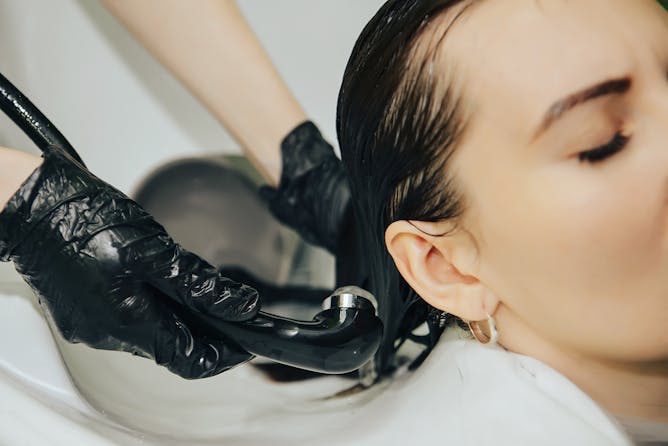Editor's note
|
|
The Salvadoran-American gang MS-13 is a vicious criminal group that specializes in rudimentary, fast-money crimes like extortion. But it is not, as the Trump administration claims, an international drug cartel, writes American University’s Stephen Dudley. After three years studying MS-13, he worries the Trump administration’s portrayal of MS-13 as a sophisticated drug trafficking organization is fueling dangerously mistaken policies.
Recent headlines breathlessly reported how nanoparticles of graphene could revolutionize the world of hair dye. Not so fast, writes Arizona State University’s Andrew Maynard. Just because they aren’t the harsh chemicals currently used in many salons doesn’t mean graphene hair dyes would be risk-free.
Nanotechnology is already in everyday products: nanosilver particles are added to many textiles to kill germs and odor. They also come out in the wash – and studies suggest they could be harmful to human health and ecosystems. University of Massachusetts Dartmouth chemists Sukalyan Sengupta and Tabish Nawaz describe their work on a method for mining nanosilver from laundry wastewater.
Today is International Day of Happiness, but Americans have less to smile about this year. In the most recent World Happiness Report rankings, the U.S. dropped four spots and now ranks 18th. According to psychology professor Marie Helweg-Larsen, Americans should look to perennial happiness powerhouse Denmark for guidance.
|
Catesby Holmes
Global Affairs Editor
|

|
|
Top Stories
|

The MS-13 gang operates in Central America, Mexico and the U.S. But so far its efforts to get into the drug business have failed.
Jose Cabezas/Reuters
Steven S. Dudley, American University
Trump justice officials portray the Salvadoran gang MS-13 as a powerful drug cartel staffed with criminal undocumented immigrants. That's a dangerous mistake if you actually want to prevent violence.
|

Subbing new risks for the current dyes’ dangers?
Evgeny Savchenko/Shutterstock.com
Andrew Maynard, Arizona State University
Less-toxic hair dye would be a great invention. But discounting the risks that come with nanoparticles could undermine other efforts to protect human health and environmental from their effects.
|

There are nanometals in your washing machine.
Evgeny Atamanenko
Sukalyan Sengupta, University of Massachusetts Dartmouth; Tabish Nawaz, University of Massachusetts Dartmouth
Many socks, towels and other textiles are treated with silver nanoparticles to kill germs and odors. When the silver washes out, it can pollute waterways. Two chemists propose a way to collect it from wastewater.
|

Okay, we get it, you’re happy – no need to rub it in.
Very_Very/Shutterstock.com
Marie Helweg-Larsen, Dickinson College
Their culture places a high value on something many Americans don't.
|
Politics + Society
|
-
John Carson, University of Michigan
How Americans decide who can come into the country and who can stay reflects beliefs about what makes people worthy of opportunity.
-
David Mednicoff, University of Massachusetts Amherst
The Trump administration may believe they have the key to an Israeli-Palestinian peace agreement – when others have failed. But it ignores how Israelis and Palestinians feel about such an agreement.
|
|
|
|
|
|
From our international editions
|
-
Natasha Rulyova, University of Birmingham
The reaction of much Russian media to the Russian spy attack highlights the paucity of different viewpoints available in Russian.
-
Nancy Gyurcsik, University of Saskatchewan; Danielle Brittain, University of Colorado
Research shows that exercise offers promise -- as an alternative to prescription opioids -- for relieving chronic pain.
-
Yohannes Gedamu, Georgia Gwinnett College
Ethiopia's recent upheavals could potentially destabilise the entire Horn of Africa.
|
|
|
|
| |
| |
|
|